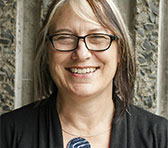30 July 2018
ISCM World New Music Days: Beijing and beyond
 Image: Glenda Keam
Image: Glenda Keam © Stephen Compton / Canterbury University
The International Society for Contemporary Music (ISCM) is a 96-year-old organisation with its roots in Europe, however in recent years and since various initiatives set in place during AMC's John Davis's terms as ISCM's President (2008-2013), it has set about expanding to include and represent the international community more comprehensively. The 2018 World New Music Days and General Assembly meetings were the first to be held in mainland China, but they won't be the last: one of the outcomes of the GA meetings was a vote for the 2021 Festival and meetings to be jointly hosted by the new Shanghai section, and the ISCM section based in Nanning, in southern China.
The following year, 2022 will mark the ISCM's centenary, and proposed locations for the festival include a trio of Austrian cities. Meanwhile, between now and 2021, these festivals will occur in Estonia (Tallinn and Tartu) in May 2019, and in New Zealand (Auckland and Christchurch) in April 2020.
The Beijing Modern Music Festival has a history as an annual festival of new music, and, in association with the Central Conservatory of Music, regularly presents guests such as Ensemble Modern, Trio Clavino, the Australian String Quartet and the New Zealand Trio - all of whom featured in this year's World New Music Days - as well as a number of other international and Chinese ensembles.
Besides chamber and choral music, the festival offered a wealth of orchestral music, including the Hanzhou Philharmonic Orchestra's performances of works by the late Hans Werner Henze, Saad Hadaad's (USA) timbrally fascinating Takht, and an unforgettable performance of Guo Wenjing's Wild Fire featuring the extraordinary talents of bamboo flutist Tang Junquiao. Other striking examples of local colour included the Suzhou Chinese Orchestra's program of works for traditional Chinese instruments and largely Chinese music, but which also included the Finnish composer Jukka Tiensuu's Ihmix.
Many of the presented works written by composers outside China featured Chinese instruments or stylistic elements. Bruce Crossman's (Australia/NZ) Garden of Fire for voice, percussion and piano, for example, demonstrated his long-standing fascination with Chinese and other Asian musics. The annual Young Composer Award, an ISCM commission for a new work supported by Vancouver-based Music on Main, was won by Israeli composer Michael Seltenreich, as a result of Ensemble Tempus Loquendi's performance of his 2010 work Sparks and Flares.
In 2017, the World New Music Days in Vancouver had aimed to present a 50/50 gender balance in its programming, and that was very nearly achieved. By contrast, this year's festival in Beijing was largely dominated by music written and conducted by men.
The General Assembly meetings of the ISCM are a significant part of the organisation's function, bringing together delegates from about 70 Sections and Associate Members representing over 50 nations. This year's meetings devoted considerable time to democratic decisions regarding the ISCM statutes, which are now being translated and lodged in the ISCM's new legal seat in Vienna. Discussions in relation to the statutes and the ISCM's activities addressed such issues as gender equity and inclusive representation, differing attitudes to terms such as 'new music' and 'contemporary music', and ways to support greater representation of music and organisations from less well-resourced geographical zones.
New delegates are frequently surprised by the extent to which the core focus of the less formalised parts of these festivals is music. Besides the inevitable cultural encounters of being away from home, and the ongoing questions of where and when food will be consumed, discussions over coffee breaks, concert intermissions, and over breakfast rarely veer too far from shared concerns and interests in music, and shared connections and new collaborations regularly arise from these interactions.
Next year's ISCM World New Music Days in Estonia (2-10 May 2019) will welcome the ISCM delegation to the Medieval heart of the city of Tallinn, with its ancient churches and deep histories. By this time the Arvo Pärt Centre (in a nearby pine-forested peninsula), which celebrates Estonia's most prodigious living composer, will be able to welcome the visitors to its exciting and innovative new building.
And in April 2020, New Zealand will welcome the ISCM delegation to Auckland and Christchurch. The World New Music Days in Sydney in 2010 were the first time the festival had occurred in the Southern hemisphere, and April 2020 will be the organisation's second visit in this part of the world, and its furthest south. Planning is well underway for a festival that showcases the country's largest city and its many wonderful performers and spaces, as well as invited guests from around the Pacific Rim, and then travels south to a newly transformed Christchurch, the largest city in NZ's South Island, with its many new buildings that have arisen since the devastating earthquakes of 2010/2011, alongside remediated and restored treasures.
We invite you all to come to New Zealand and hear what will be an unprecedented and sizzlingly stimulating showcase of the newest music from around the world, in one of the youngest countries of the New World.
> International Society for Contemporary Music ISCM (www.iscm.org)
© Australian Music Centre (2018) — Permission must be obtained from the AMC if you wish to reproduce this article either online or in print.
Glenda Keam is Vice-President of the ISCM, Associate Professor and Head of Music at the University of Canterbury in Christchurch (NZ), and Festival Director for the 2020 ISCM World New Music days in New Zealand
Comments
Be the first to share add your thoughts and opinions in response to this article.
You must login to post a comment.